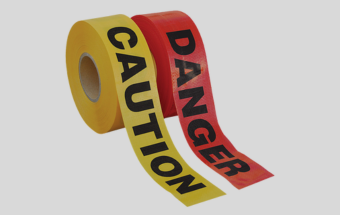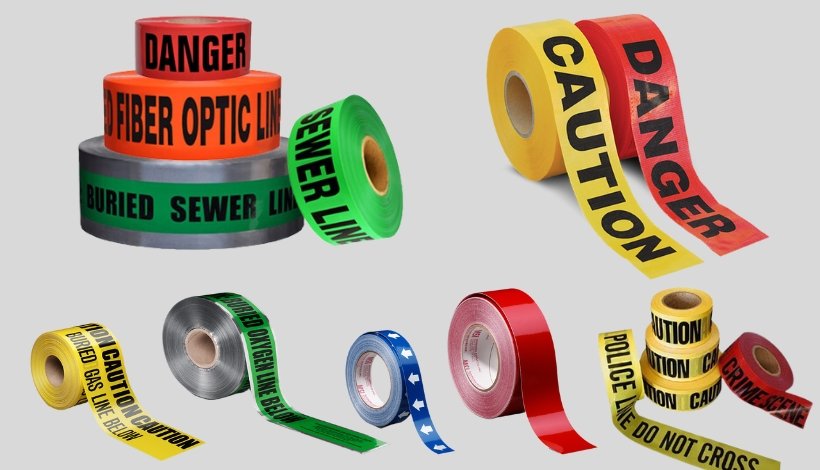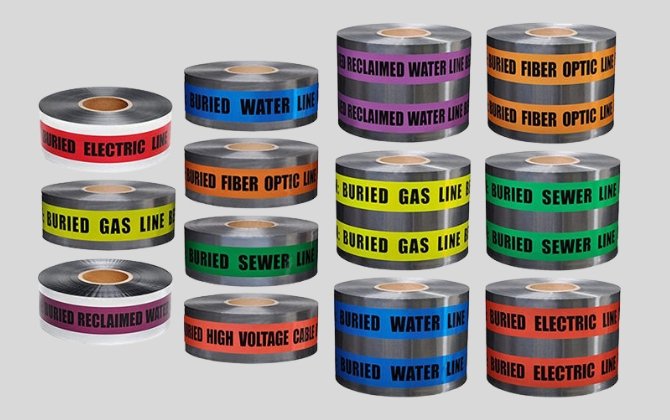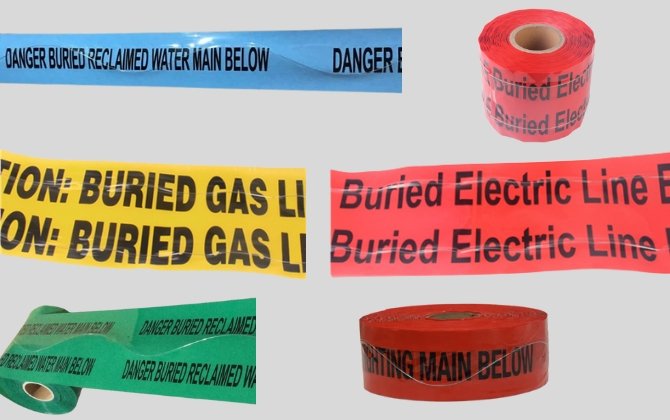Warning tape, it is a safety tool which is widely used to alert workers and others about potential hazards and prevent accident risks. However, when it comes to marking underground utilities, facilities often confuse between detectable and non-detectable warning tapes.
That’s why we’ve prepared this guide for utility and underground construction facilities like yours to help you understand the key differences between detectable vs non-detectable warning tapes. You’ll also learn about common use cases and types of detectable warning tape.
So, let’s get in.
What is Warning Tape?
A warning tape is a bright-colored and highly visible safety tape. Road contractors, safety officers, and utility facilities generally use this tape to mark hazardous areas or objects to restrict unauthorized entries and to alert people about potential danger.
At Jackwin, we manufacture these tapes in different colors, types, and material, catering to different work environment and safety requirements. Some tape even features printed message to clearly convey the nature of the hazard.

Warning Tape: Detectable vs Non-Detectable
Although warning tapes come in different types, but mainly they are categorized in two types: Detectable and Non-detectable warning tape. Let’s now understand how these both tapes are different from each other.
What is Detectable Warning Tape?
Detectable underground warning tape is a safety marking tape that is made up using plastic material and a metallic foil layer (often aluminum). Utility workers and underground contractors commonly use this tape to mark underground utility lines where lines location and detection is crucial.
Because of its metallic layer, this tape helps workers identify the location of underground utilities before start digging using a metal detector. This helps them excavate cautiously and avoid utility strikes or service disruptions risks.

What is Non-Detectable Warning Tape?
Just like detectable tape, non-detectable warning tape is also used to mark underground utilities. However, it is only made using plastic material (often polyethylene) and do not contain any metallic material, so it cannot be detected using metal detector.
Its main purpose is to provide a visual warning to workers during digging operation. So when workers dig and come across this tape, it alerts them that a utility line is buried below so they dig with caution and avoid damaging utilities.

Key Differences Between Detectable & Non‑Detectable Warning Tape
Materials & Construction
The main difference between detectable and non-detectable warning tapes is basically their construction and material.
Detectable electrical warning tape is made up using a highly-visible and conductive plastic material. It basically has a metal or steel wire embed inside the tape structure. This wire is what allows you to trace it with a metal detector.
On the other hand, non-detectable warning tape is made from highly-visible color and HPPE material. Means, these tapes cannot be detected via detection tools.
Apart from that, these tapes are also made using durable material so that the tape can withstand low temperature, moisture, UV rays and chemical effects.
Protection Level
Apart from the material and construction, both tapes also vary based on protection level. Detectable tape is more durable, and you can use it to mark utilities in high-traffic areas as this tape don’t get damage easily. On the other hand, non-detectable tape is less durable and best suitable for use in low-traffic areas.
Cost
If we talk about the cost of both tapes, since detectable tapes contain metallic material so these are costly compare to non-detectable ones. However, the cost difference is very minimal.
Color‑Codes
When you’re using warning tape to mark underground utilities, following standardized color codes is very essential. That’s because each standard color tells workers and contractors that which type of utility the tape is covering and marking.
In the below table, you’ll learn about the standard underground warning tape color codes and what each color indicates:
| Warning Tape Color | What Tape Indicates |
| Red | Electric cables, lighting cables |
| Yellow | Natural gas, oil pipelines, steam lines |
| Orange | Telephone, internet, fiber optics |
| Blue | Drinking water lines |
| Green | Sewer pipes, drain lines |
| Purple | Irrigation, reclaimed or recycled water systems |
| White | Marking areas where digging is planned |
| Pink | Surveying marks, boundaries, measurements |
Detectable Warning Tape Specifications
JACKWIN’s warning tapes, both detectable and non-detectable, are produced with 100% original HDPE (plastic) material. These tapes are best fit to mark and locate underground utilities like water, gas, electric, or telecommunication lines.
Key underground warning tape specification:
- Base Material: HDPE
- Detection Material: Aluminum or Steel wire
- Sizes: 200mmx100meters/roll, 300mmx100meters/roll
- Color Codes: blue/red/green/yellow/orange
- Other Features: Rot-resistant, low-temperature resistance, UV resistance, high Strength, acid & alkali resistant, and stretchable
Detectable Warning Tape Types
As mentioned above, detectable warning tapes come with a metallic material layer so that the tape can be detectable using metal detecting equipments. You’ll commonly find two types of detectable warning tapes in the market based on detection material option:
-
Aluminum Foil Detectable Warning Tapes
These are the most commonly used types of detectable tapes for marking underground buried lines. Aluminum foil detectable warning tape basically contain a thin layer of aluminum foil embedded inside the plastic material.
These tapes are very light-weight, affordable, highly visible, easy-to-install, and can be traced very easily with most utility locators. You can use these tapes to mark underground utilities (like gas lines, communication lines, and sewerage lines) under non-rocky soils.

-
Steel Wired Detectable Warning Tapes
These tapes are basically equipped with steel wires and are embedded inside the plastic material in two styles: Straight 2 wire (means two parallel steel wires are embedded along the length of the tape) and wave 1/ 2 wire (means one or two steel wires are embedded in the wave pattern).
Compared to foil detectable warning tape, steel wire tapes are more durable and have a stronger signal range for locator tools. That’s why you can use this tape to mark utilities in high-risk and deeper ground surfaces where signal strength is crucial.

Detectable Warning Tape vs Tracer Wire
Although detectable warning tape and tracer wire both almost do the same job and that’s to help facilities locate underground utilities using detection tools, they’re different in construction.
Detectable warning tape basically has a metallic layer (aluminum or steel) running through it. Also, it’s laid few inches (often 12 to 18 inches) above the underground buried pipe or cable. Plus, it serves two purposes: it helps you trace the presence of underground utilities and gives a visual alert.
Tracer wire, on the other hand, is a single wire, often made up of copper and coated with plastic material. Compared to tape, tracer wire is laid along the buried plastic cables, not above. This helps you find out the exact location of where utility cables are buried.
Common Applications of Detectable Warning Tape
You can use detectable warning tape in many underground utility projects. Below are some common applications:
- Gas Pipeline
Since gas lines are highly sensitive and any damage to them can lead to dangerous leaks and even catch fire. So you can use detectable tape and lay it a few inches above the buried gas pipeline. This helps workers track the area before digging.
- Fiber Optic Cable
Fiber optic cables are thin, expensive, and not easy to repair once damaged. That’s why facilities often lay tapes underground to alert crews before any digging happens.
- Water Lines
Whether it’s potable water or irrigation pipelines, when you lay detectable tape, this helps teams quickly locate where the lines are buried. That way, they dig carefully to avoid disruption during maintenance.
- Electric Cables
These cables are extremely dangerous to hit during digging. So, you can place detectable tape to warn teams in advance and allow safe identification using detection tools.
- Irrigation Systems
Large agricultural areas or parks often have buried irrigation pipelines. In such sites, detectable tape helps workers easily trace utility lines. And also avoid hitting these lines while doing ground maintenance or landscaping work.
When to Choose Detectable vs Non‑Detectable Tape?
The answer actually depends on what’s buried underground and whether it needs to be found later with a locator tool or not.
- Choose Detectable Warning Tape if
You’re working on non-metallic buried lines (like plastic gas pipes, fiber optics, or power lines). Because these tapes are bright and have a metallic layer, so they’ll do both: visually alert workers and help workers detect utilities using a locator.
- Choose Non-Detectable Warning Tape if
The buried utility is already metallic (like a steel gas line or copper cable). In such cases, you don’t really need detectable tape. You can simply place the non-detectable tape a few inches above the utility line to serve as a visual warning during excavation.
What is Detectable Warning Tape Price?
The price of detectable warning tape varies based on the material, width, length, and even manufacturer. Generally, the common price range of detectable tape falls between $10 $20 (per 1000 ft roll).
However, if you go for tape with a steel wire detection layer, the price increases more due to their construction. Their price can go from $20 up to $50+ per roll.
Here are some tips for you: If you buy in bulk, you may get lower prices per roll compared to the original price. Also, if you deal with a reliable wholesale detection tape manufacturer, you may get tapes at even more affordable rates.
Detectable Warning Tape Manufacturers
JACKWIN is leading and reliable detectable and non-detectable warning tape manufacturer and supplier in China. Our tapes comply with BS 12613:2021 & ISO 9001 & 14001 standards and are produced using high-quality HDPE material and stainless steel or aluminum wire as a detection material.
Whether you need detectable or non-detectable tape with a warning text to mark buried electrical mains, gas pipelines, street lighting cables, fire mains, fiber optic cables, water pipes or underground telephone or TV cables, Contact Us today to get an instant inquiry.
We deal with clients at factory competitive wholesale prices and also offer customized services. You can also contact us to place your customized tapes’ order for your project and our professional team will make them for you as per your width and text printing requirements.
Conclusion:
To sum up, marking underground utilities is crucial to alert workers about potential hazards. And also to prevent accidental damage and ensure that workers stay safe during excavation. For marking, you can use either detectable or non-detectable warning tape, based on the type of buried utility line.
By understanding the key differences between both that we explained in this guide, you’ll be able to select the right type of warning tape for your project.


-80x69.png)

